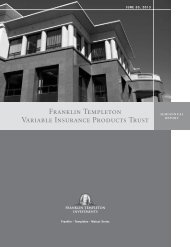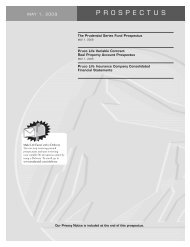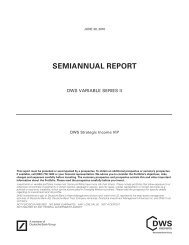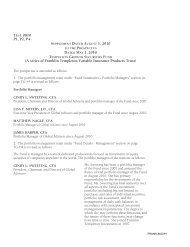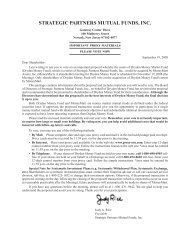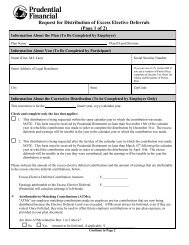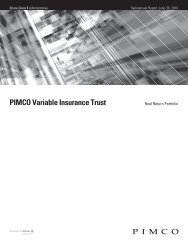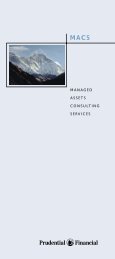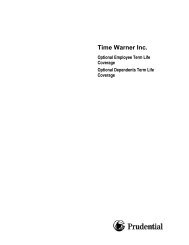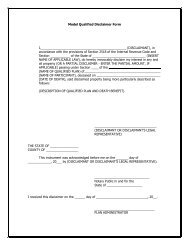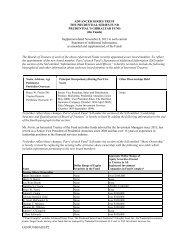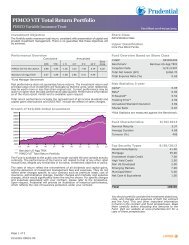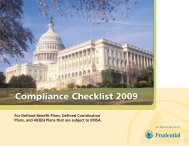Advanced Series Trust AST Academic Strategies Asset ... - Prudential
Advanced Series Trust AST Academic Strategies Asset ... - Prudential
Advanced Series Trust AST Academic Strategies Asset ... - Prudential
You also want an ePaper? Increase the reach of your titles
YUMPU automatically turns print PDFs into web optimized ePapers that Google loves.
SUMMARY: <strong>AST</strong> WESTERN ASSET CORE PLUS BOND PORTFOLIO<br />
INVESTMENT OBJECTIVES<br />
The investment objective of the Portfolio is to maximize total return, consistent with prudent investment management and liquidity<br />
needs, by investing to obtain the average duration specified for the Western <strong>Asset</strong> Core Plus Bond Portfolio.<br />
PORTFOLIO FEES AND EXPENSES<br />
The table below shows the fees and expenses that you may pay if you invest in shares of the Portfolio. The table does not include<br />
Contract charges. Because Contract charges are not included, the total fees and expenses that you will incur will be higher than the<br />
fees and expenses set forth in the table. See your Contract prospectus for more information about Contract charges.<br />
Annual Portfolio Operating Expenses (expenses that you pay each year as a percentage of the value of your investment)<br />
Management Fees .70%<br />
Distribution (12b-1) Fees<br />
Other Expenses .14%<br />
Acquired Fund Fees & Expenses -<br />
Total Annual Portfolio Operating Expenses .84%<br />
None<br />
Example. The following example is intended to help you compare the cost of investing in the Portfolio with the cost of investing in<br />
other mutual funds. The table does not include Contract charges. Because Contract charges are not included, the total fees and<br />
expenses that you will incur will be higher than the fees and expenses set forth in the example. See your Contract prospectus for<br />
more information about Contract charges.<br />
The example assumes that you invest $10,000 in the Portfolio for the time periods indicated and then redeem all of your shares at the<br />
end of those periods. The example also assumes that your investment has a 5% return each year and that the Portfolio’s operating<br />
expenses remain the same. Although your actual costs may be higher or lower, based on these assumptions, your costs would be:<br />
1 Year 3 Years 5 Years 10 Years<br />
<strong>AST</strong> Western <strong>Asset</strong> Core Plus Bond $86 $268 $466 $1,037<br />
Portfolio Turnover. The Portfolio pays transaction costs, such as commissions, when it buys and sells securities (or “turns over” its<br />
portfolio). A higher portfolio turnover rate may indicate higher transaction costs. These costs, which are not reflected in annual<br />
portfolio operating expenses or in the example, affect the Portfolio’s performance. During the most recent fiscal year ended<br />
December 31, the Portfolio’s turnover rate was 334% of the average value of its portfolio.<br />
INVESTMENTS, RISKS AND PERFORMANCE<br />
Principal Investment <strong>Strategies</strong>. The Portfolio invests, under normal circumstances, at least 80% of the value of its assets in debt and<br />
fixed-income securities. The 80% investment requirement applies at the time the Portfolio invests its assets.<br />
The target average modified duration of the Portfolio is expected to range within 30% of the duration of the domestic bond market as<br />
a whole (normally three to six years, although this may vary). Therefore, the range within which the average modified duration of the<br />
Portfolio is expected to fluctuate is generally 2.5 to 7 years. The Portfolio’s average modified duration may fall outside of its expected<br />
average modified duration range due to market movements. If this happens, the Portfolio’s subadvisers will take action to bring the<br />
Portfolio’s average modified duration back within its expected average modified duration range within a reasonable period of time.<br />
Duration refers to the range within which the average modified duration of a Portfolio is expected to fluctuate. Modified duration<br />
measures the expected sensitivity of market price to changes in interest rates, taking into account the effects of structural complexities<br />
(for example, some bonds can be prepaid by the issuer).<br />
Principal Risks of Investing in the Portfolio. The risks identified below are the principal risks of investing in the Portfolio. All<br />
investments have risks to some degree and it is possible that you could lose money by investing in the Portfolio. An investment in the<br />
Portfolio is not a deposit with a bank and is not insured or guaranteed by the Federal Deposit Insurance Corporation or any other<br />
government agency. While the Portfolio makes every effort to achieve its objective, it can’t guarantee success.<br />
Fixed income securities risk. Investment in fixed income securities involves a variety of risks, including the risk that an issuer or<br />
guarantor of a security will be unable to pay some or all of the principal and interest when due (credit risk); the risk that the Portfolio<br />
may not be able to sell some or all of the securities its holds, either at the price it values the security or at any price (liquidity risk);<br />
and the risk that the rates of interest income generated by the fixed income investments of a Portfolio may decline due to a decrease<br />
in market interest rates and that the market prices of the fixed income investments of a Portfolio may decline due to an increase in<br />
market interest rates (interest rate risk).<br />
190



